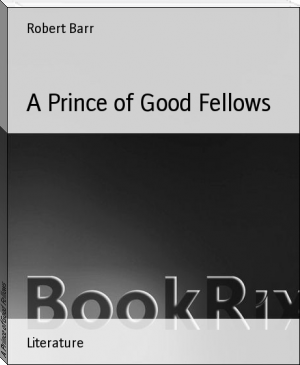A Prince of Good Fellows - Robert Barr (recommended reading txt) 📗

- Author: Robert Barr
Book online «A Prince of Good Fellows - Robert Barr (recommended reading txt) 📗». Author Robert Barr
"God save us!" cried the king. "Have we then poets in Skye?"
"The whole of the Highlands is a land of poetry, your majesty," affirmed MacDonald drawing himself up proudly, "although the very poor judges of the art in Stirling may not be aware of the fact."
The king laughed heartily at this.
"I must tell that to Davie Lyndsay," he said. "But here we have another follower of the muse who has taken the place of the first. Surely nowhere else is the goddess served by votaries so unkempt. What is this one saying?"
"He says that beautiful is the western sky when the sun sinks beneath the wave, but more beautiful still is the cheek of the Rose of Skye, the daughter of their chieftain."
"Ah, that is better and more reassuring. I think either of us, Jamie, would rather be within sight of the smiles of the Rose of Skye than within reach of the claymores of her kinsmen."
By this time the assemblage on shore became aware that visitors were approaching, and the declamation ceased. Malcolm MacLeod himself came forward on the landing to greet the newcomers. He was a huge man of about fifty, tall and well proportioned, with an honest but masterful face, all in all a magnificent specimen of the race, destined by nature to be a leader of men. He received his visitors with dignified courtesy.
"I am James MacDonald," explained that young man by way of introduction, "son of the Laird of Sleat. We heard you had built a boat for the king, and so have come to see it. This is James Stuart, a friend of mine from the Lowlands, and I have brought him with me that he may learn what boat-building really is."
"You are very welcome," said MacLeod, "and just in time, for they are taking her round the headland to Dunvegan to-morrow morning. Aye, she's a bonnie boat, if I do say it myself, for no one knows her and what she'll do better than I."
"The king should be proud of her," said MacDonald.
MacLeod tossed his shaggy head and replied with a sneer,--
"It's little the king knows about boats. He should be playing with a shallop in a tub of water, instead of meddling with men's affairs. Allaster Crottach is our king, and if he graciously pleases to tickle the lad in Stirling by saying he owns the boat, Allaster himself will have the using of her. I would not spike a plank for the king, but I'd build a fleet for Allaster if he wanted it. Has your friend the Gaelic? If he has, he may tell the king what I say, when he goes back to the Lowlands."
"No, he has no Gaelic, Malcolm, but I'll put into the English whatever you like to say."
And so he gave to the king a free rendition of MacLeod's remarks, toning them down a little, but James was shrewd enough to suspect from the manner of the man of Skye, that he held his nominal monarch in slight esteem.
Malcolm MacLeod took the strangers to his own house, which was the best in the village. Almost the entire population of the port had been working on the king's boat, and now that it was finished and launched, the place had earned a holiday. Malcolm was delighted to have visitors who could bear witness to the skill of his designing, appreciate the genius of the poets and listen to the skreigh of the piping. The strangers were most hospitably entertained and entered thoroughly into the spirit of the festivities. The morning after their arrival they cheered as lustily as the others when the twenty-six oars of the king's barge struck the water and the craft moved majestically out of the harbour. They seemed to have come into a land of good-will toward all mankind; high and low vying with each other to make their stay as pleasant as possible.
"Losh, Jamie," said the king to his friend two or three days after their arrival, "I might well have ignored your advice about the ships, as I did your base counsel about the army. I need no fleet here to protect me in Skye where every man is my friend."
"That is very true," replied MacDonald, "but you must not forget that no one has any suspicion who you are. Everyone is a friend of James Stuart of the Lowlands, but I hear nobody say a good word for the king."
"What have they against him?" asked the Guidman of Ballengeich with a frown, for it was not complimentary to hear that in a part of his own dominion he was thought little of.
"It isn't exactly that they have anything against the king," said MacDonald, perhaps not slow to prick the self-esteem of his comrade, "but they consider him merely a boy, of small weight in their affairs one way or another. They neither fear him nor respect him. The real monarch of these regions is the humpback in Dunvegan Castle; and even if they knew you were the king, your sternest command would have no effect against his slightest wish, unless you had irresistible force at the back of you."
"Ah, Jamie, you are simply trying to justify the bringing of the fleet round Scotland."
"Indeed and I am not. The only use to which you can put your fleet will be to get you away from here in case of trouble. As far as its force is concerned, these islanders would simply take to the hills and defy it."
"Ah, well," said the king, "I'll make them think better of me before I am done with them."
The week's festivities were to end with a grand poetical contest. All the bards of the island were scribbling; at any rate, those who could write. The poets who had not that gift were committing their verses to memory that they might be prepared to recite them before the judges, three famous minstrels, who were chosen from three districts on the island, thus giving variety and a chance of fairness to their decisions.
The king resolved to enter this competition, and he employed MacDonald every evening translating into the language of Skye, the poem which had been considered so good in Stirling, and MacDonald was to recite it for him at the contest. But this Homeric competition was endangered by disquieting news brought to the island by the fishermen. They reported that a powerful fleet had been seen rounding the northern coast of Scotland, and was now making towards the south. This unexpected intelligence seemed to change instantaneously the attitude of the islanders towards their two guests. Suspicion electrified the air. The news of the sighting of the fleet, coming so quickly on the advent of two strangers, who apparently had no particular business on the island, caused them to be looked upon as spies, and for a day or two they were in danger of being treated as such. The king's alertness of mind saved the situation. He had brought with him from Stirling, in case of emergencies, several sheets of blank parchment, each bearing the Great Seal of Scotland. Once more the useful MacDonald was his amanuensis. A proclamation in Gaelic was written and the signature of James the Fifth inscribed thereon. This document was enclosed with a communication, containing directions to the admiral of the fleet, and MacDonald entrusted the packet to one of his gillies, with orders that sail should be set for Loch Torridon, and the message given to the officer in command.
Three days later the ferment on the island was immeasurably increased when the guard on the headland reported that a ship of war was making direct for the harbour. A horseman was despatched full gallop to Dunvegan Castle to inform the head of the clan of the mysterious visit of the two men, followed so soon by the approach of a belligerent vessel. But before the messenger was ten miles on his way, the ceremony was over and done with. The big ship sailed majestically through the narrows, cast anchor and fired a salute. A well-manned boat was lowered and rowed to the shore. There stepped from the boat an officer in a splendid uniform, followed by a lieutenant and half a dozen men, one of whom carried the flag of Scotland. This company marched to the cross, which stood in the centre of the village, and the crowd sullenly followed, with Malcolm MacLeod at their head, not knowing what the action of the naval officer might portend, and in absence of definite orders from their chief, hesitating to oppose this inland march. Many of those on the fleet were Highlanders, and the second in command was one of them. This man mounted the three steps at the foot of the cross and stood with his back against the upright stone. His chief handed him a roll of parchment, and the subordinate officer in a loud voice, and in excellent Gaelic, cried,--
"A Proclamation from His Most Excellent Majesty, James the Fifth of Scotland! God save the King!"
At this the chief officer raised his sword in salute, and his men sent up a cheer, but the aggregation was not seconded by any of the large concourse there gathered together. Undaunted by this frigid reception the officer unrolled the manuscript and read its contents in a voice that reached to the furthest outskirts of the crowd:
"I, James of Scotland, lawful King of this realm, do
proclaim to all loyal subjects, that the safety and liberty
of my land depends on an unconquerable fleet, and that the
merit of the fleet consists in stout well-built ships,
therefore the man whom I, the King, delight to honour is he
whose skill produces the best sea-going craft, so I hereon
inscribe the name of Malcolm MacLeod, master shipbuilder, a
man who has designed and constructed a boat of which all
Scotland has reason to be proud. The King's barge of
twenty-six oars, planned by Malcolm MacLeod and built for
him by the people of Skye, will be used as a model for all
ship-builders in the Scottish navy."
The reader now looked up from his parchment and gazed over the assemblage.
"Is Malcolm MacLeod here?" he asked. "Let him step forward."
The giant, somewhat dazed, walking like a man in a dream, approached the foot of the cross. The officer rolled the proclamation and presented it to the shipbuilder, saying:--
"From the hand of the king, to the hand of Malcolm MacLeod."
Malcolm accepted it, muttering half with a smile, half with a frown,--
"E-god, the king knows a good boat when he gets it."
Then the officer uplifted his sword and cried,--
"God save the king;" and now the hills around re-echoed with the cheering.
The little company without another word retraced their steps to the small boat, and made for the ship which was now facing outward, anchor hoisted and sails spread once more, so the watching Highlanders had a view of a large vessel superbly managed, as the west wind which brought her into the harbour took her safely out again.
The royal young man had a striking lesson on the fickleness of the populace. Heretofore as MacDonald had truly said, no one had a good word to say for the king; now it was evident that James V. of Scotland was the greatest and wisest monarch that ever sat on a throne.
Malcolm MacLeod





Comments (0)